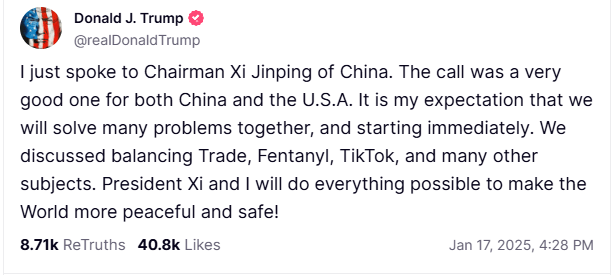
The U.S. Supreme Court has unanimously upheld a federal law banning TikTok unless its parent company, ByteDance, divests its ownership. This decision, grounded in national security concerns, has ignited debates over data privacy, free speech, and the broader impact of government intervention in tech regulation. With TikTok threatening to “go dark” on January 19 unless the Biden administration provides assurance of non-enforcement, uncertainty looms over the platform's future in the U.S.
Complex legal and political landscape
The TikTok ban, passed with overwhelming bipartisan support, was signed into law under the Biden administration, mandating ByteDance to sell TikTok to a U.S.-approved buyer or face a ban on app store distribution and hosting services. The Supreme Court's ruling upheld this measure, citing national security risks linked to TikTok's ties to the Chinese government. However, the Biden administration has signaled that enforcing the law will fall to the next administration.
President-elect Donald Trump, who previously attempted to ban TikTok in 2020 but later reversed his stance, has positioned himself as a potential negotiator. In a Truth Social post, Trump revealed discussions with Chinese President Xi Jinping, stating they addressed trade, fentanyl, and TikTok, among other issues. His statement hints at a possible shift in policy, though it remains unclear how his administration will handle the enforcement of the law.

Meanwhile, TikTok's latest statement expresses frustration over the lack of clarity from the Biden administration. The company warns that without immediate assurances, TikTok will be forced to shut down on January 19. A sale does not appear imminent, and experts suggest that while existing users may retain access, the lack of updates will eventually render the app nonfunctional.
Privacy concerns and migration to RedNote
The Supreme Court's decision largely focused on the potential risks posed by TikTok's Chinese ownership, particularly under China's 2017 National Intelligence Law, which requires companies to cooperate with government data requests. Critics argue that this law could compel ByteDance to share U.S. user data with Chinese authorities, though TikTok has repeatedly denied such claims.
However, privacy advocates, including the Electronic Frontier Foundation (EFF), argue that banning TikTok does little to address the larger issue of digital privacy. The EFF criticized the ruling for prioritizing “shaky data privacy concerns” while ignoring First Amendment implications. It also pointed out that foreign adversaries can already obtain American user data through legal and illegal means, emphasizing the need for broader consumer privacy legislation rather than platform-specific bans.
Proton warns that as TikTok users migrate to alternative platforms, some are turning to “RedNote” (Xiaohongshu), another Chinese-owned app. RedNote, though marketed as a lifestyle platform, raises similar concerns regarding data collection and potential government influence over content. Privacy experts highlight that without comprehensive data protection laws, shifting from TikTok to another app owned by a Chinese company does not eliminate security risks.
Free speech and human rights implications
Amnesty International criticized the decision, stating that banning TikTok does not solve the broader issue of Big Tech's surveillance-based business models. The organization argues that restricting access to a major social platform impedes freedom of expression, as millions of users rely on TikTok for communication, activism, and cultural exchange.
The EFF echoed these concerns, warning that shutting down a communications platform due to concerns over foreign propaganda sets a dangerous precedent. It likened the move to tactics previously condemned by the U.S. in other countries where governments have restricted digital platforms for political reasons.
With TikTok facing an imminent shutdown, all eyes are on the incoming Trump administration to determine whether the ban will be enforced, renegotiated, or overturned.








Propaganda jackals of CNcParty are happy now,great US are agreeng to their leaders’ means to some degree so obviously,damn happy censors!
Words fail me but I think this explains why we must do away with data silo and big tech. Meaning the web needs to more independent and decentralized.
Hopefully Temu and Shein are next. And to address the hypocrisy of allowing Facebook (mainly) and Google to collect so much data, well, Facebook should be fined something like $1 billion dollars. Google, maybe like $500 million.
Can I get a AAAAAAAMEN .